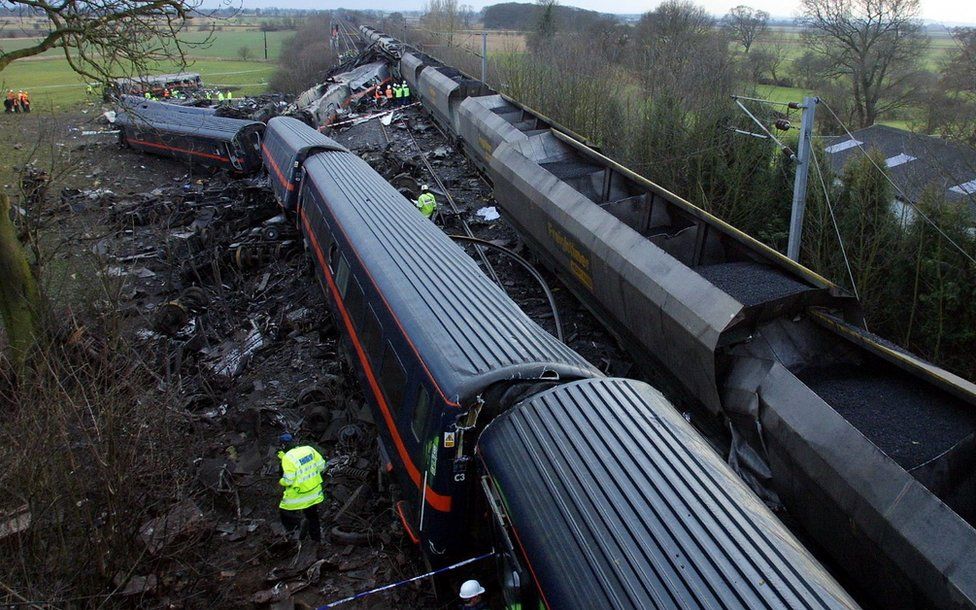Selby crash widow says 'tired driving' still a problem
- Published

Memorial events are being held 20 years after crash near Selby on 28 February 2001
A widow of one of the 10 people killed in the Selby train crash has said attitudes to tired driving have not changed 20 years on from the disaster.
Mary Dunn's husband, Steve, a locomotive driver, died when a high-speed passenger train was derailed into the path of his oncoming freight train.
The crash was caused by Gary Hart's Land Rover falling on to the track after he fell asleep at the wheel.
Mrs Dunn said accident rates where lack of rest was a factor had not changed.
Speaking at a virtual memorial event, Mrs Dunn said: "What I'm really sad about and I believe Steve would be too, is the attitude to tired driving."
Mary Dunn said the events of the day "should never be forgotten"
She added: "Steve and I were both advanced motorists. Ironic that he was killed by someone whose standard of driving fell well short of normal.
"I really hoped that would change as a result of Great Heck, but alas it hasn't."
Mrs Dunn said available statistics for the number of accidents where it is "assumed or presumed that lack of rest is a causative factor" show it has not changed in the last 20 years.
She added: "Unfortunately, it can't be proved."
Mr Dunn was one of four railway workers and six passengers who died when an InterCity passenger service and a fully-laden coal train collided at a combined closing speed of more than 140mph at Great Heck near Selby, North Yorkshire.
It happened after a GNER Newcastle to London passenger service struck the Land Rover, which had careered off the M62 motorway and crashed onto the track.
One of the coaches rolled 360 degrees anti-clockwise and ended up in a field 427ft (130m) from the bridge
The derailed passenger train was then hit by the Freightliner train carrying 1,600 tonnes of coal coming the other way.
Driver Gary Hart, from Lincolnshire, could not move his vehicle off the tracks and was calling the emergency services when the crash happened.
Hart, who had had little sleep the night before, denied falling asleep at the wheel but was given a five-year jail sentence after being found guilty of 10 charges of causing death by dangerous driving.
Reflecting on the day of the tragedy Mrs Dunn said the couple's two sons, Andrew and James, had been "robbed of their daddy".
"We went to bed as a normal family that shrove Tuesday, but woke up to our world having been devastated."
Colleagues said the events of the day had had a profound effect on the "whole railway family"
She added: "Twenty years ago this morning an individual wrecked and took the lives of many people that is what we're remembering today."
Online memorial events have been broadcast from Great Heck and Newcastle station with relatives of some of those who died laying wreaths.
More than 350 people affected by the crash and other well-wishers watched virtually as an LNER passenger service slowed and sounded its horn along with a Freightliner locomotive named in memory Steve Dunn.
Reverend Eleanor Robertshaw, and Diane Ryan, Assistant Curate, lay wreaths during a virtual memorial to the Great Heck rail disaster
David Horne, managing director at LNER, said the events of that day were "embedded in our memories" and the impact it had on the "railway family" was profound.
Also speaking at the memorial, Donald Heath, a former British Rail project director, recalled being on the passenger train that morning.
He said: "I'd like to thank all those who rallied round that day.
"I have to say how lucky I was."
Follow BBC Yorkshire on Facebook, external, Twitter, external and Instagram, external. Send your story ideas to yorkslincs.news@bbc.co.uk or send video here.
Related topics
- Published28 February 2011